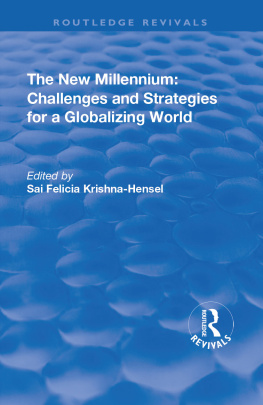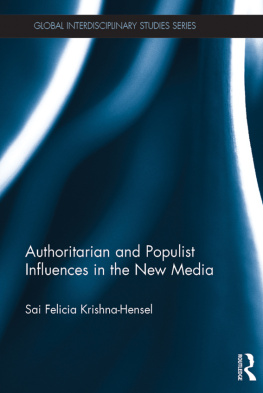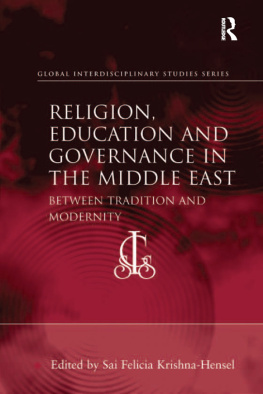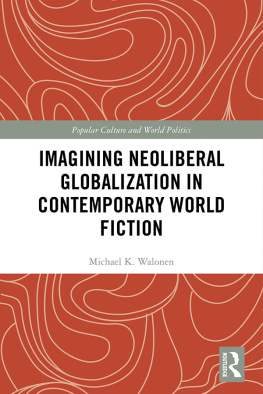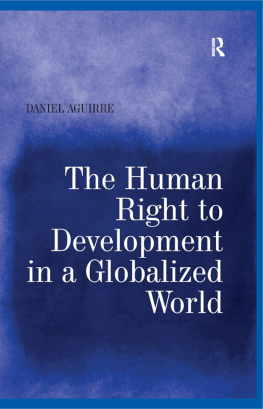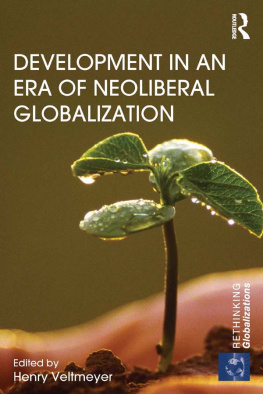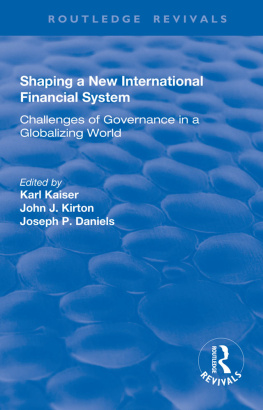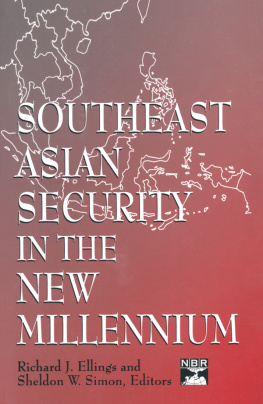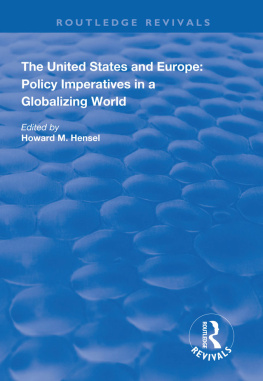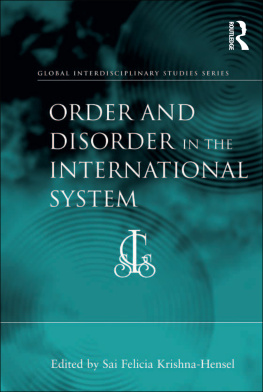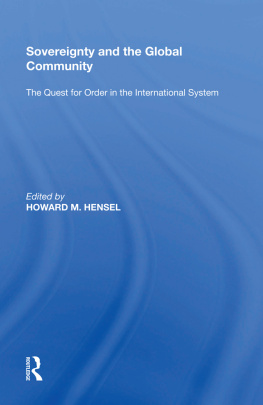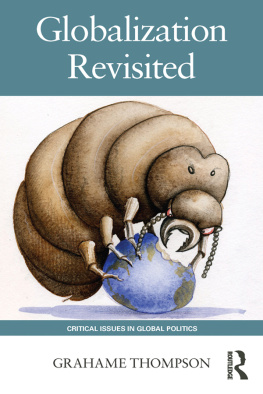THE NEW MILLENNIUM: CHALLENGES AND STRATEGIES FOR A GLOBALIZING WORLD
This collection represents a significant contribution to the dialogue on the complexities of globalization and the challenges that face the international system as it enters the new millennium. The essays contribute to the understanding of the delicate balance between transnational and national issues as the world integrates on some levels while continuing to manifest disintegration on other levels. The book emphasizes the importance of an interdisciplinary perspective in understanding the dynamics underlying the process of global transformation. The essays are organized along broadly interconnected thematic lines: a global perspective, a regional view, economic and technological trends, and the individual in a globalizing world. The interdisciplinary nature of this text makes it ideal for courses which include issues of human rights, security, finance, and technology.
This book is dedicated to my mother,
Eluri Udayarathnam, a global citizen before her time whose
inspiration and encouragement has prepared me and
countless others for the globalized world of the
twenty first century.
The New Millennium: Challenges and Strategies for a Globalizing World
Edited by
SAI FELICIA KRISHNA-HENSEL
First published 2000 by Ashgate Publishing
Reissued 2018 by Routledge
2 Park Square, Milton Park, Abingdon, Oxon OX14 4RN
711 Third Avenue, New York, NY 10017, USA
Routledge is an imprint of the Taylor & Francis Group, an informa business
Copyright Sai Felicia Krishna-Hensel 2000
All rights reserved. No part of this book may be reprinted or reproduced or utilised in any form or by any electronic, mechanical, or other means, now known or hereafter invented, including photocopying and recording, or in any information storage or retrieval system, without permission in writing from the publishers.
Notice:
Product or corporate names may be trademarks or registered trademarks, and are used only for identification and explanation without intent to infringe.
Publishers Note
The publisher has gone to great lengths to ensure the quality of this reprint but points out that some imperfections in the original copies may be apparent.
Disclaimer
The publisher has made every effort to trace copyright holders and welcomes correspondence from those they have been unable to contact.
A Library of Congress record exists under LC control number: 00133618
ISBN 13: 978-1-138-73452-4 (hbk)
ISBN 13: 978-1-315-18718-1 (ebk)
Contents
Sai Felicia Krishna-Hensel
Mehdi Mozaffari
James R. Scarritt
Liisa Laakso
Linda L. Dolive
Guy Poitras
Erhan Bykakinci
Dimitri Christopoulos
John Doyle
Nayantara Hensel
Philip J. Bryson
Ronald R. Sims, Eric H Erickson, III and Jeffrey P. Erickson
Daniel S. Papp and David S. Alberts
Marlene Wind
Rekha Datta
Elaine Levine
It is a truism that we live in a rapidly shrinking planet. Daily we hear terms such as globalization, the global economy and global competition. As each of us sits on our own little island of personal experience, these terms often become so abstract as to render them almost meaningless. We sometimes lack the vocabulary to make sense of our shrinking world. The collection of works contained in this volume represents an important step in developing a vocabulary that deals with globalization and all that term implies. By examining the forces now shaping our world, from communications technology to regionalism to democratization, the authors help us understand how these forces are working and anticipate how they will continue to change the way we live. Solutions to problems such as human rights and poverty must be attacked at the same time as we struggle with political corruption, financing our economic activities, and ensuring national and regional security. The very complexity of these problems demands integrated, multi-level solutions, and the authors insights light our way. I was privileged to participate in the Paris conference, and am heartened that it produced this interesting and useful vehicle for sharing that experience.
John J. Veres III
Director
Center for Business and Economic Development
Auburn University Montgomery
This volume draws together a representative selection of contemporary research on the changes confronting the international system in the new millennium. Most of these papers were presented at the CISS/ISA Paris Conference, which was held on August 9-10, 1999. This was the first international comparative and interdisciplinary conference convened to discuss these historic issues and it provided a forum for scholars from all over the world to come together to analyze the challenges confronting the world system. An important goal of the meeting was to offer strategies, in cooperation with policy makers and practitioners, to deal with global problems. This occasion marked the beginning of a significant interdisciplinary effort towards the study of global change.
The underlying theme of this collection of essays is the complexity of the challenges faced by the international system as it enters the new millennium. The shape of the new world order is being driven by many forces unleashed through economic interdependence and global communications. The boundaries of the international system, historically, determined by national and regional polities are being redrawn today along new ethno-political lines. Ethnicity has become a major force in determining nationalism. In the changing world of globalization, it is revealing an elasticity, which enables peoples to define, select, and transmit an identity that may lead to more equitable socio-political arrangements. In many ways, it has replaced the role of political ideologies in the international system. The changing world invariably presents a number of challenges that require a coordinated effort in dealing with them. The extent and diversity of these problems requires a multidisciplinary effort for understanding the issues involved. In the analysis often lies the strategy for dealing with the issue. It is hoped that these scholarly analyses will contribute to the understanding of a complex process that has come to characterize the future of the international system. This book is distinctive in emphasizing the importance of interdisciplinary analysis and in its organization of the contributions along broadly interconected thematic lines. This is a global effort to understand globalization. It is hoped that the volume will be a significant contribution to the dialogue on globalization that is underway at this time.
The first section takes a global view of change and explores broad trends of the future. The role of globalization in determining the shape of the new international order is explored in the introductory essay. This assessment emphasizes the complexity underlying the interpretation of globalization as an engine driving change, as well as a description for the conditions brought about by change itself. The paradigm of the three faces of globalization is offered as an analytical framework for describing the different perspectives of a complex and often controversial phenomenon. In the second essay, Mehdi Mozaffari avers that globalization represents a new era in international politics as well as in the destiny of mankind. He explores the relationship between global capital and global civilization concluding with a call for a new definition of civilization. In the third chapter, James Scarritt offers a neo-Parsonian perspective for a theoretical framework that can be used in formulating strategies to deal with the multiple challenges of the new millennium. The information-energy exchange theoretical framework is presented as a means towards developing and testing theories about the interrelations between globalization, democratization, and social movements. The global perspective also involves several studies that analyze broad underlying issues in the international system of the new millennium. Liisa Laakso assesses the challenges to the international community posed by collapsed or weak states in the next chapter. Her paper considers the waning power of states in a world that is increasingly driven by market forces and economic competitiveness, aptly noting that weak states can have unwanted consequences for the international system. In the concluding essay of this section Linda Dolive examines how democracy as a form of governing provides the foundation for and sustaining of corruption. Court records, indictments, and media accounts reveal corrupt legislators and executives at the pinnacles of power in the major industrial democracies of France, Great Britain, Italy, Japan, and the United States. The paper discusses the types of, extent of, and nature of corruption among democratic regimes and assesses the conditions allowing corruption to flourish. She concludes that facilitating conditions for political corruption derive from numerous democratic characteristics and norms.

